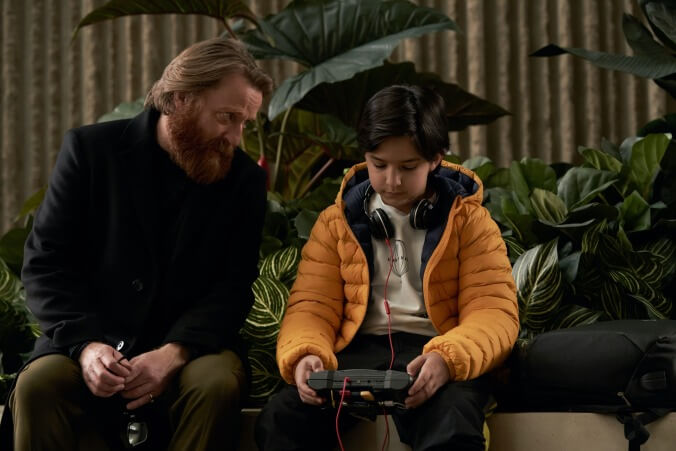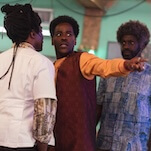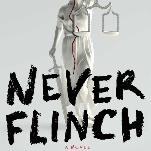Photo: Photograph by Ian Watson/HBO Max
We get a twofer this week, with each episode on opposite ends of the spectrum. I loved the first one, “Rosencrantz and Guildenstern Aren’t Dead,” particularly for its production design, its complex character dynamics, and—most of all—deviating from the book in a way that feels suspenseful yet familiar.
It also solves my main problem before, a little clumsily: The way Kirsten’s trauma was considered special among the theater troupe was odd, considering everyone, as she says, lost everything 20 years ago. But here, the true contrast comes from her and Alex, the puckish Philippine Velge. Alex doesn’t remember life from before, and at 20, she’s sick of being stuck with the people who raised her, and sick of being treated like a child. She remains stubborn even after Kirsten, former director Gil (David Cross), his new partner Katrina, and other members of the theater troupe point out the layered lies the cult leader told. Alex is irritated by everyone around her telling her to stay away from danger and that she has no sense, when they are in fact completely correct.
Above all, the fourth episode of Station Eleven succeeds the most so far because it shows people acting just like people usually do. Sure, capitalism may be gone along with anything that records (whether it’s a phone or a camcorder), but a 20-year-old is going to feel restless and long to rebel and leave her family, and a woman is going to be jealous and hurt when her husband remarries. Alex also points out how much trauma live in the minds of the pandemic survivors, who don’t trust and stick fervently to the same paths they always do out of safety, which certainly makes sense to me. To be without Google Maps is to be lost, in my geographically-challenged opinion. But for the theater group, and the other pre-pandemic people, a familiar path that is never veered from is like a defense mechanism. But to Alex, it looks like a painful groove they’re walking, a canyon that has been left even after the glacier has moved on.
The one problem is that, without technology or enough in the way of peers, Alex doesn’t know how natural her feelings and reactions are. The way she leaves for the cult and fights with Kirsten is almost like the plot-line in The Americans, when Elizabeth and Philip were shocked that Paige became involved in the church. Paige’s speech about how strange and untrusting things were was par for the course for an American kid telling her (unknown to her) immigrant parents how irritating their constant vigilance is. That’s basically Alex’s frustration.
Even the fight Kirsten has with Alex is mirrored in her fight with Jeevan, when (it’s implied) they last saw each other, at the cabin in the snow in year one. It’s the same fight about feeling responsible for a child that isn’t yours but which your basic instincts say you need to keep alive. The implication here is Jeevan left Kirsten in the same way that they left Frank, which is the same way she lost her parents.
Watching the shifting dynamics of the theater troupe is also delightful. This episode was funny, even using the classic sitcom staple, an actual minefield. Hey, it was a classic in M*A*S*H, right? I found the conductor Sarah troublesome—the idea of her sleeping with Kirsten is kind of creepy, considering Sarah found her and took her in as a child. But Lori Petty is just too charismatic, turning Sarah’s pettiness at Gil’s new wife into a real vibrancy and vulnerability. All this makes the child suicide bombers even more upsetting beyond just being child suicide bombers.
The fifth episode, “The Severn City Airport,” is almost the complete opposite. It leaves the warm, naturalistic style of the theater troupe for the cold tundra of a small town airport in Michigan. Of course the theater troupe is going to be tight-knit. As anyone who has even met a theater kid in high school will tell you, they may love drama but they love each other more! But the airport is truly where the worst people in the world are, because who isn’t the worst when they’re miserable and stressed out and smelly and uncomfortable and cramped, even when they aren’t even in the goddamn plane? I have been on a plane only a few times since the pandemic, but I am never more stressed than in an airport.
The people at the airport that become a begrudging community were dropped there on day one of the pandemic. They are confused and prickly, and snap at one another constantly. Unlike the theater group, which has the advantage of being 20 years in the future, the people at the airport are naïve, entitled, and riddled with anxiety. They seem, overall, a lot stupider and more malleable than the theater group, demonstrating what a difference a pandemic makes on a psyche. (HA HA HA.) This is Clark’s episode, but it’s also where we find the origin of the dangerous prophet. Tyler is around Kirsten’s age at the beginning of the pandemic, who also gets the Station Eleven comic book by way of his father, Arthur Leander. Here’s another way that Gael García Bernal was so miscast—the Arthur who Clark, Elizabeth, and Tyler talk about and around bears very little resemblance to the warm, open man we saw earlier.
In the book, I believe Tyler and his mother Elizabeth get caught up with the janitor who sweeps a bunch of others away in a creepy, cultish way, taking a bunch of young women with him. Remember how I said this show and the original book reminds me of zombie apocalypse novels? The many cults, and the discussions around leadership and cult, remind me of Severance by Ling Ma, where the main character gets caught up in a cult. The cults that pop up in apocalyptic media are often founded by manipulative men who often peddle a kind of creepy gender essentialism, a predatory protection, in their cults. Or perhaps that is just all cults, anywhere.
Tyler’s character is harder for me to follow in the show. Elizabeth’s immature mothering can perhaps answer for some of it, but Tyler is just so aware. He is aware of her betrayal, and the betrayal of people around him. While Kirsten had to fend for herself physically more than emotionally, Tyler takes for granted his protection, but finds himself in emotional situations that are above and beyond his abilities to understand them. So I don’t think it’s fair for Clark to act like Tyler is just a fucking weirdo kid. The strangest part is when Tyler brings a man, who was stuck on the plane that was abandoned wholesale when the pandemic began, into the airport with seeming no understanding of why that would be upsetting to everyone. Wouldn’t it have made more sense for him to go get Clark? After his mom and his quarantine, he also starts to hang out with the corpses on the plane???
Perhaps that’s what Clark means when he says Tyler has a penchant for destruction—especially since the episode ends with Tyler burning all his corpse friends on the plane and running away. A mighty cliffhanger.
Stray Observations
- That comic must be made with archival paper to last that long. Even a ziplock bag and a dark cabinet wouldn’t stop it from fading. Miranda’s watercolor skills remind me of Lucy Knisley’s work, with Pia Guerra style pencils…which makes sense, considering Guerra was the main penciller and the co-creator of Y: The Last Man.
- Tyler says the last thing he downloaded off the internet ever was the Wikipedia article on capitalism. “What if I delete it?” “We’ll just invent it again,” says Elizabeth.
- The clutter of the country club Gil and Katrina live on reminds me of the beginning sequence of the pilot of The Last Man On Earth, where he’s getting all these random things from around the world, including the eagle rug from the oval office.
- The humor was so much better this episode, thanks to the theater troupe: “Hi!” “Don’t talk to him.” and “We’re doing Hamlet set in Poland.” “Portland.” “Whatever.” “Huh?” were my favorite exchanges.
- Enrico Colantoni (Veronica Mars’ dad!) plays the bike messenger who keeps trying to get the theater to come to the prophet, was previously Elizabeth’s boyfriend in the beforetimes. God, how did he end up there?
- Tyler, the kid, who grows up to be the prophet, is so completely different in looks from the adult actor, it’s surreal. At least Kirsten’s child self and her adult self have the same strong brows. Tyler’s whole face is closed as a child, and strangely open (but MORE creepy) as an adult. It’s… weird.








































